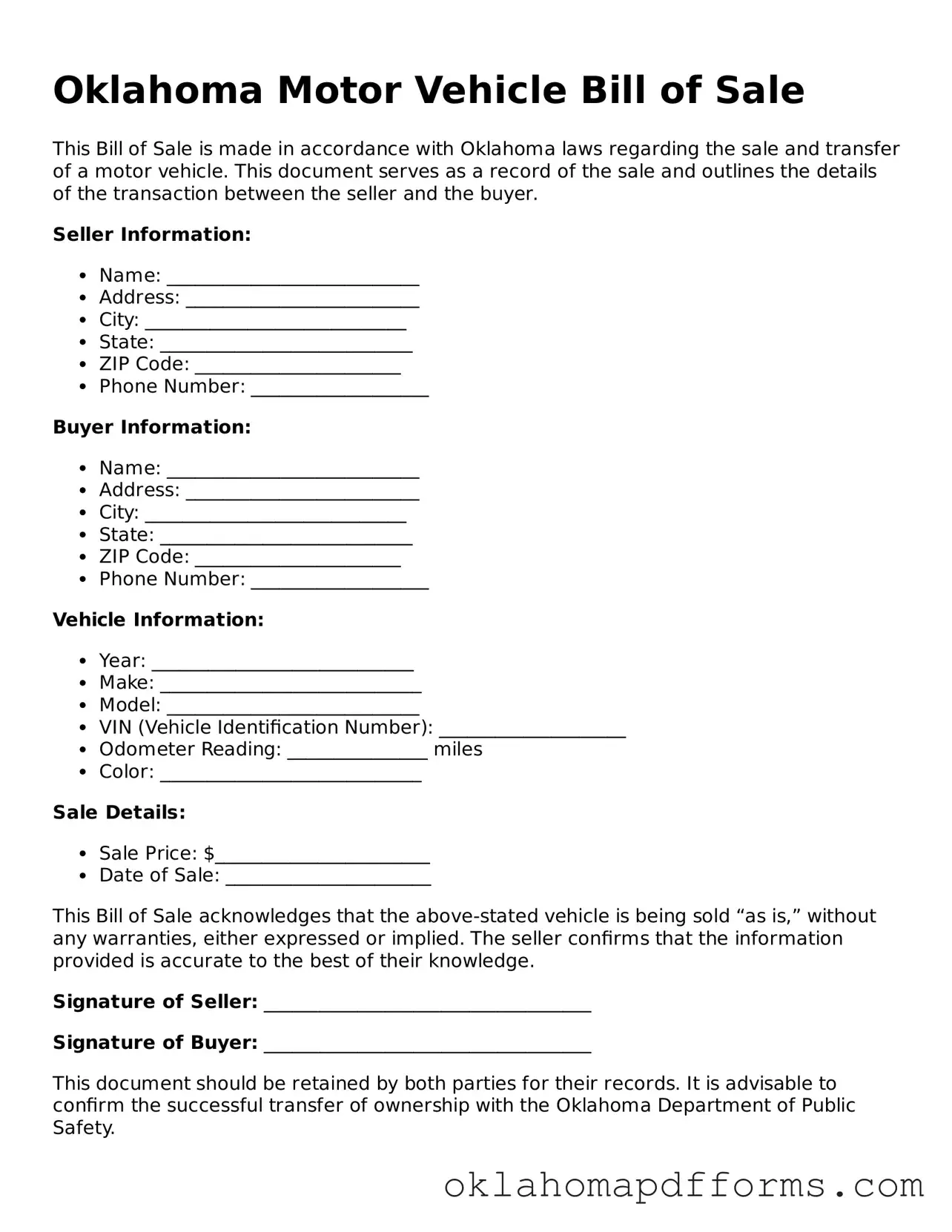What is a Motor Vehicle Bill of Sale in Oklahoma?
A Motor Vehicle Bill of Sale is a legal document that records the transfer of ownership of a vehicle from one party to another in Oklahoma. It serves as proof of the transaction and includes essential details about the vehicle, the seller, and the buyer. This document is important for both parties, as it helps protect their rights and provides a record of the sale.
Why do I need a Bill of Sale for a vehicle?
Having a Bill of Sale is crucial for several reasons. First, it provides evidence of the transaction, which can be important for tax purposes or if any disputes arise in the future. Second, it helps establish a clear record of the sale, including the sale price and the condition of the vehicle at the time of sale. Lastly, it is often required when registering the vehicle in the new owner's name.
What information is included in an Oklahoma Motor Vehicle Bill of Sale?
The Bill of Sale typically includes the following information: the names and addresses of both the seller and buyer, the vehicle identification number (VIN), make, model, year, and odometer reading at the time of sale. Additionally, it should state the sale price and the date of the transaction. Some forms may also include a statement regarding any warranties or representations made by the seller.
Is a Bill of Sale required in Oklahoma?
While a Bill of Sale is not legally required to sell a vehicle in Oklahoma, it is highly recommended. Without it, proving ownership and the details of the transaction can become complicated. In some cases, the Department of Motor Vehicles (DMV) may request a Bill of Sale when you go to register the vehicle in your name.
Can I create my own Bill of Sale?
Yes, you can create your own Bill of Sale in Oklahoma. However, it is essential to include all necessary information to ensure that it is legally valid. Many templates are available online, and using one can simplify the process. Just make sure it contains all the relevant details to protect both parties involved in the transaction.
Do I need to have the Bill of Sale notarized?
In Oklahoma, notarization of the Bill of Sale is not required. However, having the document notarized can add an extra layer of security and authenticity, which may be beneficial in case of any disputes. It can also provide peace of mind for both the seller and the buyer.
What should I do with the Bill of Sale after the sale?
After the sale is completed, both the seller and the buyer should keep a copy of the Bill of Sale for their records. The seller may need it for tax purposes, while the buyer will need it to register the vehicle in their name. It’s wise to store these documents in a safe place, as they may be needed in the future.
What if the vehicle has a lien on it?
If the vehicle has a lien, it is crucial to address this before completing the sale. The seller should ensure that the lien is paid off, or the buyer should be informed of the lien and agree to assume responsibility for it. The Bill of Sale should clearly state any existing liens to avoid future complications for the buyer.
Where can I find a Bill of Sale form for Oklahoma?
You can find a Bill of Sale form for Oklahoma at various sources. The Oklahoma DMV website often provides downloadable forms, or you can find templates online through legal document websites. Additionally, local office supply stores may carry printed forms. Just ensure that any form you use meets the state’s requirements.

